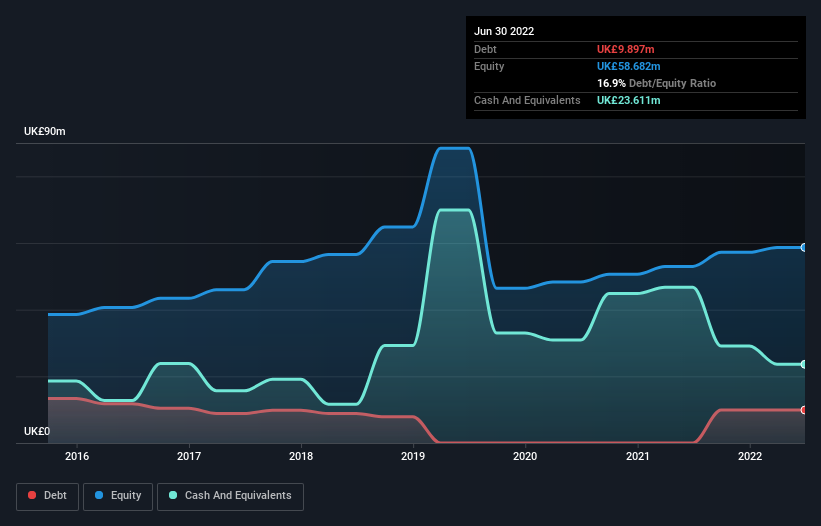These 4 Measures Indicate That Aptitude Software Group (LON:APTD) Is Using Debt Reasonably Well
Howard Marks put it nicely when he said that, rather than worrying about share price volatility, 'The possibility of permanent loss is the risk I worry about... and every practical investor I know worries about.' So it seems the smart money knows that debt - which is usually involved in bankruptcies - is a very important factor, when you assess how risky a company is. We can see that Aptitude Software Group plc (LON:APTD) does use debt in its business. But should shareholders be worried about its use of debt?
Why Does Debt Bring Risk?
Debt and other liabilities become risky for a business when it cannot easily fulfill those obligations, either with free cash flow or by raising capital at an attractive price. If things get really bad, the lenders can take control of the business. However, a more common (but still painful) scenario is that it has to raise new equity capital at a low price, thus permanently diluting shareholders. By replacing dilution, though, debt can be an extremely good tool for businesses that need capital to invest in growth at high rates of return. The first step when considering a company's debt levels is to consider its cash and debt together.
See our latest analysis for Aptitude Software Group
How Much Debt Does Aptitude Software Group Carry?
As you can see below, at the end of June 2022, Aptitude Software Group had UK£9.90m of debt, up from none a year ago. Click the image for more detail. But it also has UK£23.6m in cash to offset that, meaning it has UK£13.7m net cash.
How Healthy Is Aptitude Software Group's Balance Sheet?
According to the last reported balance sheet, Aptitude Software Group had liabilities of UK£39.9m due within 12 months, and liabilities of UK£17.7m due beyond 12 months. Offsetting these obligations, it had cash of UK£23.6m as well as receivables valued at UK£16.7m due within 12 months. So its liabilities total UK£17.3m more than the combination of its cash and short-term receivables.
Since publicly traded Aptitude Software Group shares are worth a total of UK£235.1m, it seems unlikely that this level of liabilities would be a major threat. But there are sufficient liabilities that we would certainly recommend shareholders continue to monitor the balance sheet, going forward. Despite its noteworthy liabilities, Aptitude Software Group boasts net cash, so it's fair to say it does not have a heavy debt load!
The modesty of its debt load may become crucial for Aptitude Software Group if management cannot prevent a repeat of the 29% cut to EBIT over the last year. When a company sees its earnings tank, it can sometimes find its relationships with its lenders turn sour. When analysing debt levels, the balance sheet is the obvious place to start. But it is future earnings, more than anything, that will determine Aptitude Software Group's ability to maintain a healthy balance sheet going forward. So if you're focused on the future you can check out this free report showing analyst profit forecasts.
Finally, a company can only pay off debt with cold hard cash, not accounting profits. Aptitude Software Group may have net cash on the balance sheet, but it is still interesting to look at how well the business converts its earnings before interest and tax (EBIT) to free cash flow, because that will influence both its need for, and its capacity to manage debt. Happily for any shareholders, Aptitude Software Group actually produced more free cash flow than EBIT over the last three years. There's nothing better than incoming cash when it comes to staying in your lenders' good graces.
Summing Up
We could understand if investors are concerned about Aptitude Software Group's liabilities, but we can be reassured by the fact it has has net cash of UK£13.7m. The cherry on top was that in converted 143% of that EBIT to free cash flow, bringing in UK£2.5m. So we are not troubled with Aptitude Software Group's debt use. When analysing debt levels, the balance sheet is the obvious place to start. But ultimately, every company can contain risks that exist outside of the balance sheet. For example - Aptitude Software Group has 2 warning signs we think you should be aware of.
When all is said and done, sometimes its easier to focus on companies that don't even need debt. Readers can access a list of growth stocks with zero net debt 100% free, right now.
Have feedback on this article? Concerned about the content? Get in touch with us directly. Alternatively, email editorial-team (at) simplywallst.com.
This article by Simply Wall St is general in nature. We provide commentary based on historical data and analyst forecasts only using an unbiased methodology and our articles are not intended to be financial advice. It does not constitute a recommendation to buy or sell any stock, and does not take account of your objectives, or your financial situation. We aim to bring you long-term focused analysis driven by fundamental data. Note that our analysis may not factor in the latest price-sensitive company announcements or qualitative material. Simply Wall St has no position in any stocks mentioned.
Join A Paid User Research Session
You’ll receive a US$30 Amazon Gift card for 1 hour of your time while helping us build better investing tools for the individual investors like yourself. Sign up here

 Yahoo Finance
Yahoo Finance 
